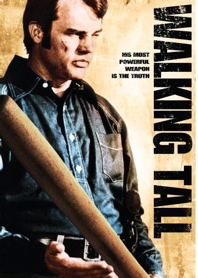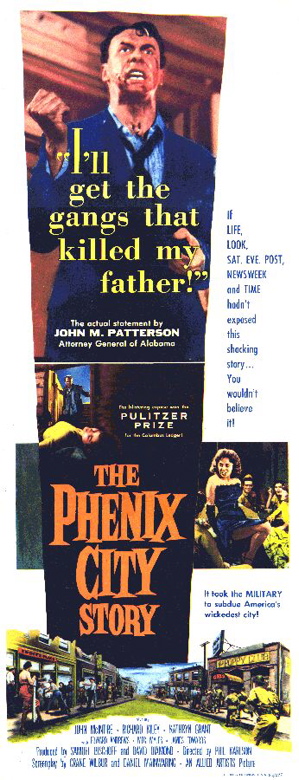| Release List | Reviews | Price Search | Shop | Newsletter | Forum | DVD Giveaways | Blu-Ray/ HD DVD | Advertise |
| Reviews & Columns |
|
Reviews DVD TV on DVD Blu-ray International DVDs Theatrical Reviews by Studio Video Games Features Collector Series DVDs Easter Egg Database Interviews DVD Talk TV DVD Talk Radio Feature Articles Columns Anime Talk DVD Savant HD Talk Horror DVDs Silent DVD
|
DVD Talk Forum |
|
|
| Resources |
|
DVD Price Search Customer Service #'s RCE Info Links |
|
Columns
|
 |
Walking Tall |

|
Walking Tall Paramount 1973 / B&W / 1:78 anamorphic widescreen / 124 min. / Street Date November 20, 2007 / 14.99 Starring Joe Don Baker, Elizabeth Hartman, Gene Evans, Noah Beery Jr., Bruce Glover, Felton Perry, Richard X. Slattery, Rosemary Murphy, Ed Call, Douglas Fowley, John Myhers, Kenneth Tobey, Lurene Tuttle, Leif Garrett Cinematography Jack A. Marta Production Design Stan Jolley Film Editor Harry W. Gerstad Original Music Walter Scharf Written by Morton Dowling, Mort Briskin Produced by Mort Briskin Directed by Phil Karlson |
The original Walking Tall was an enormous box office success. It combined the reactionary law 'n' order theme of Dirty Harry with the newly rediscovered market for movies with a southern-rural setting. Cagily constructed and well acted, the modestly budgeted vigilante thriller delivered what so-called unsophisticated audiences wanted to see: sex, violence and a homegrown hero big enough to stand up to the scummy bad guys. An idealized riff on the story of a real 1960s Tennessee sheriff -- who was shot several times while upholding the law -- Walking Tall stars the likeable Joe Don Baker as the lawman who indeed walks tall and carries a big stick.
The recent remake is a disposable and generic action picture, but its 1973 source is best viewed in light of an older movie by the same director, 1955's scorching film noir classic The Phenix City Story, of which Walking Tall is itself more or less a remake -- adjusted for the times.
The best way to explain Walking Tall is to say that it plays to the cheap seats. It's too sentimental to be lumped in with the urban cynicism of Dirty Harry and Death Wish and instead develops its own brand of 'good ole boy' vigilante corn. Buford Pusser is based on a real sheriff, a legend of McNairy County; more than one adulatory web page keeps his legend alive. But his screen incarnation might as well be Hopalong Cassidy, a true blue guy who stands up to fight injustice -- mainly because he's mad as hell and won't take it any more.

Walking Tall presents several authenticated incidents in Pusser's career and uses the names of real people, like the incumbent Sheriff who opposed Buford but died just before the election. Pusser's career has so many similarities to director Karlson's The Phenix City Story that a comparison is unavoidable. That older film is an exposé noir, based on the real life crusade of the Patterson Family against organized gambling and vice in Alabama. The idealistic Army lawyer John Patterson (Richard Kiley) returns from prosecuting German war criminals to find his town choked by the vice district. A local friend who protests the cheating at the Poppy Club is beaten, and later murdered. John's father Albert (John McIntire) eventually runs for office to oppose the gangsters. A beautiful card dealer (Kathryn Grant) spies on the Poppy Club for the Pattersons, but the reformers have a spy in their camp as well. The popular gangsters, led by the oily Rhett Tanner (Edward Andrews) use thugs to terrorize the opposition. When Albert won't cooperate, the goonish Clem Wilson (John Larch) strangles a black child and throws her body onto the Pattersons' front yard. A note pinned to the girl reads, "This will happen to your kids too." More assassinations and murders follow.
Phenix City is basically about liberal outrage. Morton Dowling and Mort Briskin's script for Walking Tall organizes the same elements into an ode to vigilantism. Buford has returned home because he's disillusioned about the lack of honesty in pro wrestling, a hilarious, idiotic joke in itself. In Phenix City, John Patterson's wife eventually takes the kids and moves out of harm's way. Wife Pauline frets and pouts when Buford risks the lives of his family, but eventually does the right thing and encourages her husband to pick up a gun. In yet more NRA-boosting sentimentalism, Buford's son gets a rifle for Christmas, and pointedly uses it to watch over his dad's hospital bed.
Phenix City is established as 'evil' mainly by showing a vice den run by a tough woman who dresses like a man. A song about 'dice, women and booze' expresses the sin that the Production Code won't allow to be shown. In Walking Tall the hookers are out in the open and the butch madam (Rosemary Murphy) is much more overt. Instead of a 'good girl' card dealer, Buford's inside contact is prostitute Luan (Brenda Benet) who establishes her credentials by making her entrance in an almost completely see-through blouse.
Phenix City's black population is visibly suppressed. Patterson befriends janitor Zeke Ward (James Edwards), whose family is almost wiped out by Rhett Tanner's thugs. Walking Tall's token gesture is having Buford befriend and support Obra Eaker both as a worker and a deputy, but almost no ordinary blacks appear in the movie. A black dance club is popular (on a sunny afternoon?) but no blacks are seen in exteriors. With the acceptance of Civil Rights, southern blacks seem to have become invisible.
The pandering continues. When a racist is moved by Buford's commitment and apologizes to Obra Eaker, Buford's response is to suggest that the black deputy is the one who should learn a lesson. Buford survives attack after attack, yet somehow survives. Inspired by his example, Luan snitches on the crooks and leaves town still wishing that the sheriff would give her a tumble. The murder of a main character is so over-telegraphed ("Isn't this a lovely day? Don't you wish it could go on forever?") that you'd think American audiences had forgotten how to follow a story.
Actually, compared to the mob in Phenix City, the Lucky Spot thugs are a bunch of amateur creampuffs, the kind that leave hideous scars all over the hero but foolishly leave him alive. In the old movie, Rhett Tanner and the Poppy Club hoods are actually cautious about who they kill. Although they own the state all the way to the capitol, they need good public relations to keep the general public quiet. The movie condemns vigilantism outright. The Walking Tall hoods don't even know how to intimidate a jury, and the crooked sheriff is an obvious idiot. The evil out-of-town organized crime envoy is played by John Myhers, best known as a goofy executive in How to Succeed in Business Without Really Trying. Buford's successes are all seen as the acts of a "good bully": he continues to carry his Biblical 'big stick", the symbol of his divine right to mete out punishment as he sees fit. Buford forcibly relocates the crooked judge's office to the men's room. The Lucky Spot mob fumbles every attempt to kill Buford, although a gunshot to the head puts the sheriff in a half-face cast that makes him look like a Golem (or, now, Hannibal Lecter).
Phenix City ends with most of the protagonists dead, but the hero refuses to kill the evil mobster on principle. The mob's defeat may only be momentary. Walking Tall plays up its personal tragedies but finishes as a feel-good picture about payback. The gangsters are wiped out, and an all-white group of funeral mourners becomes a vigilante mob. Phenix City ends with a similar mob ready to burn down the sin emporiums, but the hero tells them to vote instead. Made eighteen years later, Walking Tall is a huge backward step ... politically, Middle America is becoming more primitive. Along with pictures like Death Wish, its simplifications erode public faith in the due process of law. 1
Director Phil Karlson plays all of Walking Tall's melodrama straight and doesn't waste time on details. Most of the sets are on the ticky-tacky side and the film looks to have been shot by experts on a tight schedule. Bit parts are filled by name actors like Kenneth Tobey and Bruce Glover. Leif Garret is Buford's young son. Joe Don Baker and the ill-fated Elizabeth Hartman (The Group, You're a Big Boy Now) are solid in the leads.
Paramount's DVD of Walking Tall is an excellent enhanced transfer with good color and clear sound; the silly title song by Johnny Mathis sounds fine. The disc comes with no extras. Subtitles appear in English, Spanish and Portuguese.
On a scale of Excellent, Good, Fair, and Poor,
Walking Tall rates:
Movie: Good
Video: Excellent
Sound: Excellent
Supplements: None
Packaging: Keep case
Reviewed: December 27, 2007
Footnote:
1. Jan 1, 2008: I realize this is too much info on Phenix City Story for a review of Walking Tall, but I've just received a note from Brian Mosely, and a link to his Shelbyville Times-Gazette articles with Jack Culpepper on the old days of the 'most wicked city in America, Phenix City Alabama. They're very good.
Return
Reviews on the Savant main site have additional credits information and are more likely to be updated and annotated with reader input and graphics.
Review Staff | About DVD Talk | Newsletter Subscribe | Join DVD Talk Forum
Copyright © 1999-2007 DVDTalk.com All rights reserved | Privacy Policy | Terms of Use
|
| Release List | Reviews | Price Search | Shop | SUBSCRIBE | Forum | DVD Giveaways | Blu-Ray/ HD DVD | Advertise |





